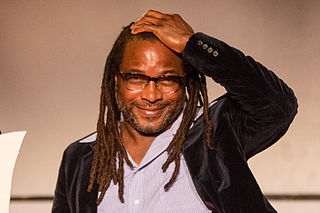
Akinwande Oluwole Babatunde Soyinka, known as Wole Soyinka, is a Nigerian playwright, novelist, poet, and essayist in the English language. He was awarded the 1986 Nobel Prize in Literature, for "in a wide cultural perspective and with poetic overtones fashioning the drama of existence", the first sub-Saharan African to be honoured in that category. Soyinka was born into a Yoruba family in Abeokuta. In 1954, he attended Government College in Ibadan, and subsequently University College Ibadan and the University of Leeds in England. After studying in Nigeria and the UK, he worked with the Royal Court Theatre in London. He went on to write plays that were produced in both countries, in theatres and on radio. He took an active role in Nigeria's political history and its campaign for independence from British colonial rule. In 1965, he seized the Western Nigeria Broadcasting Service studio and broadcast a demand for the cancellation of the Western Nigeria Regional Elections. In 1967, during the Nigerian Civil War, he was arrested by the federal government of General Yakubu Gowon and put in solitary confinement for two years, for volunteering to be a non-government mediating actor.

Obafemi Awolowo University (OAU) is a federal government-owned university that is located in the ancient city of Ile-Ife, Osun State, Nigeria. The university was founded in 1961 and classes commenced in October 1962 as the University of Ife by the regional government of Western Nigeria, which was led by Samuel Ladoke Akintola. It was renamed "Obafemi Awolowo University" on 12 May 1987 in honour of Obafemi Awolowo (1909–1987), the first premier of the Western Region of Nigeria, whose idea the university was.

Biyi Bandele was a Nigerian novelist, playwright and filmmaker. He was the author of several novels, beginning with The Man Who Came in From the Back of Beyond (1991), as well as writing stage plays, before turning his focus to filmmaking. His directorial debut was in 2013 with Half of a Yellow Sun, based on the 2006 novel of the same name by Chimamanda Ngozi Adichie.

Nahzeem Olufemi "Femi" Mimiko is a Nigerian educational administrator and former vice chancellor of Adekunle Ajasin University, a state-owned university named after the former governor of Ondo State, Nigeria, Adekunle Ajasin. The university was ranked the best state university in Nigeria by the United States Transparency International Standard (USTIS) in April 2014. Mimiko was the only vice chancellor delegate at the National Conference in Nigeria held in 2014 under the administration of President Goodluck Jonathan. Mimiko assumed office in January 2010 and was preceded by Philip Olayede Abiodun. In 2016, he had a stint as African and African-American Studies Associate, at Harvard University, Cambridge, MA, USA.

Sango: The Legendary African King is a 1997 epic Nigerian film, written by Wale Ogunyemi, produced and directed by Obafemi Lasode. The film depicts the life and reign of the legendary fifteenth century African king Sango, who ruled as the Alaafin of Oyo and became an important deity of the Yoruba people.
Chief Peter FatomilolaListen is a Nigerian dramatist, film actor, poet and prolific playwright.

Rachel Oniga was a Nigerian film actress.
Antar LaniyanListen is a Nigerian veteran actor, film producer, and director.
Femi Adebayo Salami(Listen) is a Nigerian film director, film actor, lawyer, producer and Special Adviser to the Governor of Kwara State on Arts, Culture and Tourism. He is the son of the veteran actor Adebayo Salami.
Femi BranchListen is a Nigerian actor, director and producer.
Femi Ojo Ade was a Nigerian writer, novelist, poet, critic and Professor Emeritus of French Studies and Black History.
Niji Akanni is a Nigerian dramatist, screenwriter, director, producer and filmmaker.

Femi Odugbemi is a writer, filmmaker, television producer, and founder/executive Producer of Zuri24 Media, a content production company in Lagos.
Chief Olusegun "Segun" Olusola was a Nigerian television producer, broadcaster and diplomat. He was the writer and executive producer of The Village Headmaster, Nigeria’s longest running television soap opera that stars Justus Esiri and Femi Robinson.
Adams Ibrahim Adebola, popularly known as VJ Adams, is a Nigerian video jockey, television presenter, entrepreneur, musician cum executive producer. His journey into limelight came after he contested at the 2008 edition of Next Movie Star West Africa. Adams is a presenter on Soundcity TV, a Nigerian music channel based in Lagos. He co-anchored the official red carpet at the 8th Africa Movie Academy Awards with Nollywood actress Alex Okoroji and co-anchored 2014 edition of the City People Entertainment Awards ceremony which was held in Lagos.

Felabration is an annual music festival conceived in 1998 by Yeni Anikulapo-Kuti in memory and celebration of her father Fela Kuti, a Nigerian musician and human rights activist known for pioneering the afrobeat genre of music. The one-week-long event which is held annually at the New Afrika Shrine in Ikeja, attracts visitors from different countries and has thus been considered as an official tourist destination by the Lagos State Government.

Fifty is a 2015 Nigerian romantic drama film, directed by Biyi Bandele and released on 18 December 2015.
Femi Falana, SAN In the town of Ilawe, Ekiti State He is a Nigerian lawyer and Human right activist.He is also the father to Folarin Falana popularly known as Falz. Femi Falana is a well-known activist for human rights, always trying to show sympathy towards people.Femi Falana is well known for opposing oppression, from successive military authorities.

Woli Arole is a Nigerian comedian, actor and on-air personality. Professionally he is called Arole, Woli Arole.
![]() Listen (born 4 December 1955) is a Nigerian veteran musician, film director and producer, songwriter, music producer, and playwright. [1] He is the chief executive officer of Even-Ezra Nigeria Limited, the stable that produced an award-winning movie titled Sango in 1997. [2] [3]
Listen (born 4 December 1955) is a Nigerian veteran musician, film director and producer, songwriter, music producer, and playwright. [1] He is the chief executive officer of Even-Ezra Nigeria Limited, the stable that produced an award-winning movie titled Sango in 1997. [2] [3] 








